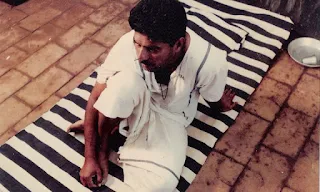Elippathyam (Rat Trap, Malayalam; 1982)
Story, Direction: Adoor Gopalakrishnan
Story, Direction: Adoor Gopalakrishnan
We are all caught in cages. The trouble is we do not know we are trapped and go around in circles with our daily chores. Like a rat in her trap, the rat continues eating the bait left there. So here we are, caught in our comfort zones and contending with the status quo. We do not realise our fate is sealed, but we still carry on unperturbed, like an ostrich burying its head underground, hoping everything will disappear.
We find this approach easier. Cracking our brains and thinking of the possibilities of things that may or may not go wrong is exhausting. May as well just go with the flow.
The master moviemaker, Adoor Gopalakrishnan, came up with this simple story with symbolic reference to the changing times in Kerala, where feudalistic ways slowly evolved by revolution by the people. The feudal lords, who did not keep up with the change of the times, were just run over.
Rat trap is a metaphor for life. The menacing rat ensnared in the film just shows the reality of life that the characters lead.
Three siblings of a landlord clan live in an old disused ancestral home that had seen better times. There is the elder brother who does nothing but eat, sleep, read newspapers and oils himself. Then a 30-year-old sister is the designated home keeper who primarily runs the household. She cooks, washes cleans and maintains the house. She longs to be married and start a family, but the elder brother, who assumes the role of the head of the family, seems not interested in getting a prospective groom for her. Maybe he just turns down all proposals to keep her slogging for him. The youngest is still in high school, pampered and demands all niceties. She is madly in love with a boy. She elopes with her boyfriend, leaving her rat trap home for good.
Different people have different ways of dealing with the predicament they are in. Some just take everything in a stride, hoping that things will change. Better times will ensue. Others would not all the negativities lying down but use their every last energy to entangle themselves from the offending forces. Whilst they are others, who would use their statuses and every thread of opportunity to be in control, pinning others down to work for them.
A must-watch.



.jpeg)













